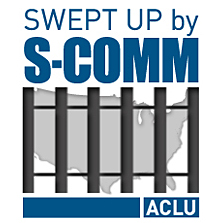
Editor’s Note: This is the fourth of five blogs in a series focusing on firsthand experiences with Secure Communities from across the country.
Most graduate students are known to spend nights in numerous places ‚ÄĒ libraries, cubicles and maybe even a party.
But Perla Rodriguez, a graduate student and naturalized citizen, spent three nights in jail, with no reasonable explanation.
“They just told me they wanted to make sure I was not undocumented, so while they investigated I had to remain in prison," Perla .
It all started on a mundane Friday evening when California Highway Patrol officers stopped Perla for making an incomplete stop. The officers asked where she was born and then arrested her for driving under the influence of alcohol. At the county jail, officers fingerprinted Perla, took a blood alcohol test and told her she would be released in a few hours.
Soon those hours turned to days. ‚ÄúThose three nights and two days seemed eternal,‚ÄĚ Perla. ‚ÄúAt one point I tried to sleep through the day to numb my nerves, yet sleep was hard to attain under that level of stress.‚ÄĚ
Perla was told that she could not be released due to an ICE hold that was triggered under the Department of Homeland Security’s Secure Communities (S-Comm) program. Perla’s sister presented her U.S. passport to the jail officials two times that weekend but the officers refused to release her.
Finally, Perla‚Äôs sister spoke to an ICE officer Monday afternoon who said that the new DHS fingerprinting system showed her status as ‚Äúpending.‚ÄĚ Upon presentation of Perla‚Äôs passport to the ICE officer, Perla was released ‚ÄĒ nearly three days after she would have been released from the traffic-released arrest. The California Department of Motor Vehicles returned her license a few weeks later, indicating that she had been driving within the legal blood-alcohol limit.
Perla never committed a crime. And she is a U.S. citizen. Yet she was taken in unlawfully and forced to prove her citizenship. And sadly, she’s not alone in facing this experience since S-Comm went into effect.
Perla’s story is just one of many shared at a hearing on California’s TRUST Act, a bill authored by Assembly Member Tom Ammiano that would allow local jurisdictions to opt out of S-Comm and provide protections for crime victims. These stories led more than 70 organizations, law enforcement individuals and cities to support the legislation. The California Assembly and Senate Public Safety Committee passed the bill out in 2011 and the bill will continue its journey when the legislature resumes this January.
If local jurisdictions gain the ability to opt out of S-Comm under the TRUST Act, it will go a long way. In the two-year period from October 2008 until September 2011, more than 55,233 individuals were deported from California under S-Comm, despite the fact that more than 70 percent serious crimes. And because California has more foreign born residents than any other state, many Californians are affected by S-Comm’s errors. In 2008, almost 30 percent of California’s .
After Perla’s incident, her county sheriff, Ed Prieto, supported the TRUST Act and lobbied to opt Yolo County out of S-Comm but DHS has so far refused these requests. Let’s just hope we don’t need similar incidents in every county before other law enforcement officials take a similar stand.
UPDATE: This post has been amended to add the author of the TRUST Act, Assembly Member Tom Ammiano.
Learn more about Secure Communities: Sign up for breaking news alerts, , and .

